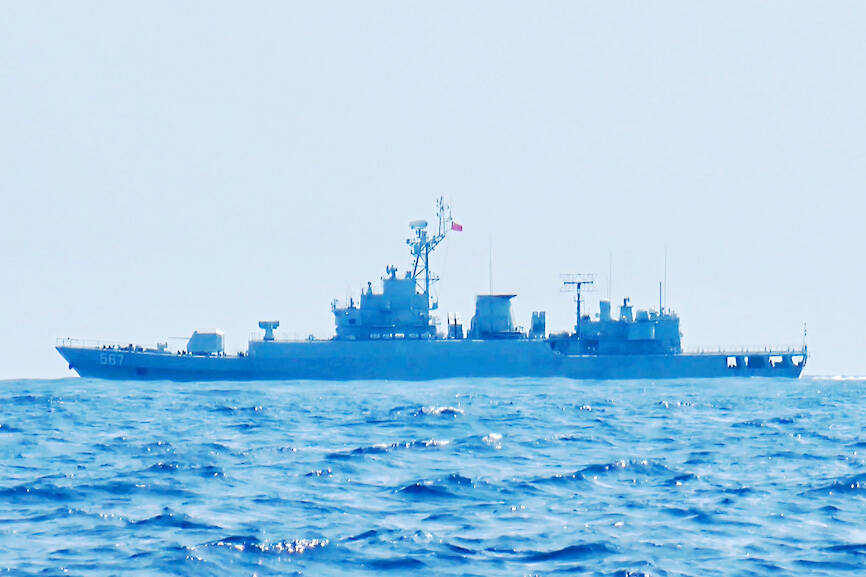The military four times last month drove away Chinese forces attempting to approach the nation’s sensitive contiguous zone in a ramped-up campaign by Beijing to “intimidate” voters before key elections, security officials said.
Officials have repeatedly said that China is trying to sway voters toward candidates seeking closer ties with Beijing, which has framed the Jan. 13 presidential and legislative elections as a choice between “peace and war” and urged Taiwanese to make the “right choice.”
Over the past four years, Taiwan has reported regular Chinese military incursions.

Photo: Screen grab from Taiwan ADIZ Facebook page
China has stepped up such missions as election campaigning has kicked into high gear, security officials and Taipei-based diplomats have said.
Last month, China’s air and naval forces staged four coordinated maneuvers that appraoched Taiwan’s contiguous zone, which is 24 nautical miles (44km) from its coast, said multiple security officials and an internal Taiwanese memo summing up China’s activities.
The Chinese military maneuvers were part of a “multi-front campaign of voting interference” that included exchange activities with Taiwanese politicians and the spread of misinformation to sway public opinion, the memo said.
The contiguous zone drills were “simulating an intrusion and testing the response of our national military,” said one of the officials, who asked to remain anonymous because of the sensitivity of the matter.
Taiwan dispatched forces to drive the Chinese away, the source said.
China’s Taiwan Affairs Office and Ministry of National Defense did not respond to requests for comment.
Chinese activities last month also included balloons that crossed the median line in the Taiwan Strait for two days in a row, as well as marine research ships approaching close to the contiguous zone off Taiwan’s eastern and western shores, the officials said.
A Chinese commercial tugboat also entered Taiwan’s territorial waters in the south, which are 12 nautical miles from its coast, they said.
“Through these military and non-military [maneuvers], they were making a statement that they can do something to Taiwan anytime while keeping the tensions up,” an official said. “It is evident psychological warfare. They are spreading the message of peace and war every day.”
A second official described the Chinese maneuvers as part of Beijing’s escalating campaign of “gray zone” warfare, seeking to wear Taiwan down with repeated drills and to “intimidate” voters.
“They want to make it look like their prophecy might come true,” the person said, referring to the narrative that if the Democratic Progressive Party (DPP) stays in power, a war with China is likely.
Vice President William Lai (賴清德), the DPP’s presidential candidate, and DPP vice presidential candidate Hsiao Bi-khim (蕭美琴) are leading in the polls. China has rebuffed Lai’s offers of talks.
The Ministry of National Defense said that 12 Chinese fighter jets and a suspected weather balloon had crossed the median line last week.
Taiwan on Monday sent its forces to monitor a Chinese carrier strike group, led by the aircraft carrier Shandong, sailing through the Taiwan Strait.

The CIA has a message for Chinese government officials worried about their place in Chinese President Xi Jinping’s (習近平) government: Come work with us. The agency released two Mandarin-language videos on social media on Thursday inviting disgruntled officials to contact the CIA. The recruitment videos posted on YouTube and X racked up more than 5 million views combined in their first day. The outreach comes as CIA Director John Ratcliffe has vowed to boost the agency’s use of intelligence from human sources and its focus on China, which has recently targeted US officials with its own espionage operations. The videos are “aimed at

STEADFAST FRIEND: The bills encourage increased Taiwan-US engagement and address China’s distortion of UN Resolution 2758 to isolate Taiwan internationally The Presidential Office yesterday thanked the US House of Representatives for unanimously passing two Taiwan-related bills highlighting its solid support for Taiwan’s democracy and global participation, and for deepening bilateral relations. One of the bills, the Taiwan Assurance Implementation Act, requires the US Department of State to periodically review its guidelines for engagement with Taiwan, and report to the US Congress on the guidelines and plans to lift self-imposed limitations on US-Taiwan engagement. The other bill is the Taiwan International Solidarity Act, which clarifies that UN Resolution 2758 does not address the issue of the representation of Taiwan or its people in

US Indo-Pacific Commander Admiral Samuel Paparo on Friday expressed concern over the rate at which China is diversifying its military exercises, the Financial Times (FT) reported on Saturday. “The rates of change on the depth and breadth of their exercises is the one non-linear effect that I’ve seen in the last year that wakes me up at night or keeps me up at night,” Paparo was quoted by FT as saying while attending the annual Sedona Forum at the McCain Institute in Arizona. Paparo also expressed concern over the speed with which China was expanding its military. While the US

SHIFT: Taiwan’s better-than-expected first-quarter GDP and signs of weakness in the US have driven global capital back to emerging markets, the central bank head said The central bank yesterday blamed market speculation for the steep rise in the local currency, and urged exporters and financial institutions to stay calm and stop panic sell-offs to avoid hurting their own profitability. The nation’s top monetary policymaker said that it would step in, if necessary, to maintain order and stability in the foreign exchange market. The remarks came as the NT dollar yesterday closed up NT$0.919 to NT$30.145 against the US dollar in Taipei trading, after rising as high as NT$29.59 in intraday trading. The local currency has surged 5.85 percent against the greenback over the past two sessions, central